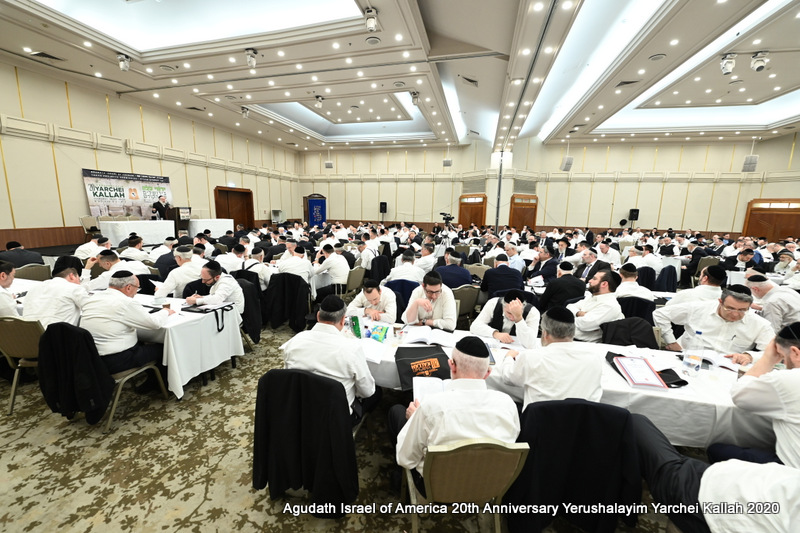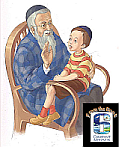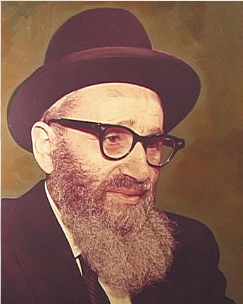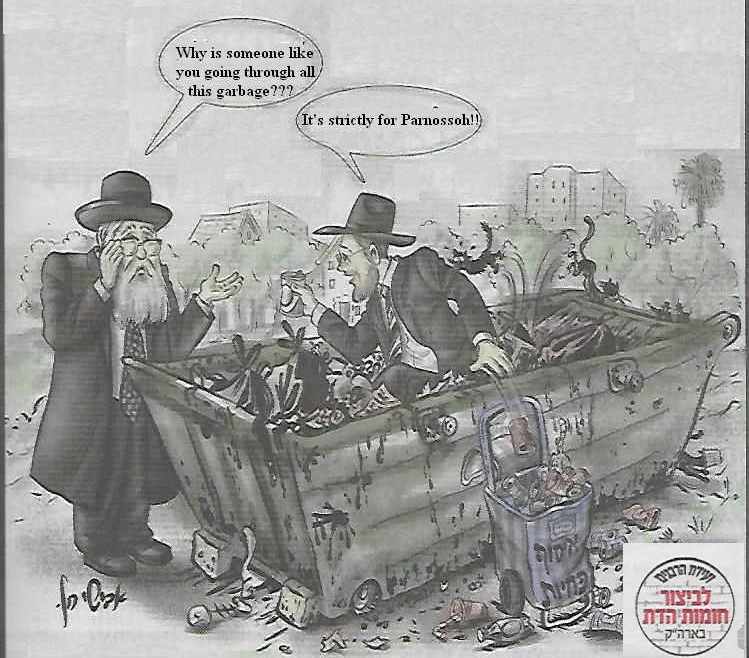  |
|
| ||||||
This Google Custom Search looks only in this website. The 20th annual Yerushalayim Yarchei Kallah of Agudath Israel of America
Glimpses of greatness set the tone for the week as participants in the 20th annual Yerushalayim Yarchei Kallah spent a breathless Sunday on a journey that spanned the continents and the centuries, inspiring them to reach for the highest heights in limud haTorah.
Buoyed by the inspiration that reached unprecedented levels 46 days ago at the Siyum HaShas, hundreds left their day-to-day lives and businesses behind to join Agudath Israel of America's Torah Projects Commission at the Yarchei Kallah, to plumb the depths of the sugya dekallah, which this year delves into inyanei tefillah. Doctors, lawyers, accountants, and businessmen from all across the globe cast aside their regular schedules, arriving in Yerushalayim to take advantage of a pre-Yarchei Kallah visit to the Israel Museum in Givat Ram where they took in a display of antiquities dating back to both the first and second Batei Mikdosh.
The following commentary was released by HaRav Chaim Kanievsky in response to a letter written by R' Chizkiyohu Yosef ben Soroh Feiga, who needs a refuah sheleimah among all the sick of Yisroel.
BS"D Shvat, 5780
The din in Shulchan Oruch Orach Chaim (146) is that from the time the sefer Torah is opened to read from it, it is absolutely forbidden to speak even one word, and even between the aliyahs and there is no heter whatsoever, and this is based on the din of the gemora in Sotah. Similarly during the time of Chazoras Hashatz it is absolutely forbidden to speak and [one who does so] has a sin that is too great to bear as it says in the Shulchan Oruch (124).
"Lieberman speaks like one of the worst anti-Semites in the world, even foaming at the mouth. In a letter, I appealed to the attorney general, and spoke to him twice as well, but to my great regret, received no reply.
"It is clear to all that if such words had been spoken or written against any group favored by the public or by the media, the situation would be altogether different and a legal charge would have been issued against him. But against chareidim, no bars hold."
New elections will take place in another 10 days. According to all predictions, on the following day, the relation of strengths between the political blocs will remain the same. The Rightist-Chareidi bloc will not be able to establish a new government, similarly with the Leftist-Lieberman block.
The one who will be able to tip the balance will be the "United List" (Reshima Meshutefet), which, even if it does not join the government, will be able to thwart Gantz from forming a government. According to present declarations, this Arab List will not vote for a government which includes Lieberman, nor will Lieberman give his vote for a government leaning upon the Arab politicians.
So far there are no reported cases of the Covid-19 virus in Israel. To preventa any outbreak, the Health Ministry is prepared to enforce a quarantine upon those returning from the East. To this end, supervisors will begin to make surprise visits to those travelers. Simultaneously, people from the Ministry will assist the neighbors of those travelers to inform on them by telephone in the event that they don't adhere to the guidelines established.
The following ma'amar is a combination of many different shmuessim that were said by Reb Dovid zt"l over the years as the mashgiach in Yeshivas Ner Yisroel in Baltimore. This ma'amar was recently edited and printed together with many other hitherto unpublished shmuessim in two volumes entitled Sichos Chochmah Umussar. This shmuess was chosen to translate and print because of its insight to our present day situation — in particular of the innumerable, seemingly difficult to understand, tragedies that have become commonplace.
Part II
Covert Miracles: The Torah's Promises of Brochos and Kelolos
This matter is explained at greater length in the Ramban's introduction to Iyov:
"We fully believe in complete hashgocho, that, `The eyes of Hashem scan the whole world' (Zecharya 4:10) — that Hashem sees what both the evil and the righteous do. This is also true concerning hashgocho mofsis, i.e., with regard to all the Torah's promises and miracles. There is no significant difference between a promise that a certain tzaddik will live until the end of his days — living eighty years quietly and serenely — and a promise that another [non-Cohen] person who ate terumah will die, or [between these and] what was said to Chananya ben Azur: `You shall die this year, for you have spoken a falsehood in the name of Hashem' (Yirmiyohu 28:16); [or between all these and] krias Yam Suf, the mann falling for forty years, the pesukim of, `I will take sickness out from the midst of you' (Shemos 23:25) and, `I will send the pestilence among you (Vayikra 26:25), `I will also send wild beasts among you that will rob you of your children' (ibid., 22), or the makkoh of the first born, the pestilence and the orov, the drowning of Egypt in the sea, [and] `But against any of the children of Yisroel not a dog shall move its tongue' (Shemos 11:7), and `bnei Yisroel went on dry land in the midst of the sea' (ibid. 15:19). Likewise there is no difference between the tefillos of Dovid Ben Yishai, our daily tefillos, and all the miracles [in the Torah].
"If we were to say that nature sustains everything, we would have to say that no one dies or lives because of a zechus or a chovah. But once we believe that Hashem can cut off someone's life prematurely, we understand that the hand of Hashem can perform miracles and change nature by splitting the sea before His congregation and drowning His enemies within. There is no difference this or that one except the difference between the covert and the openly known . . . "
The Ramban writes the very same thing in his explanation of the brochos and kelolos in parshas Bechukosai (Vayikra 27:11):
"All of the brochos are absolute miracles. It is not natural for rain to fall, for us to have peace from enemies, for them to be frightened and for a hundred to flee from five — all when we do the chukim and the mitzvos, nor for everything to be just the opposite if we sow in the seventh year. Although these are concealed miracles, because the world appears to conduct itself normally during them, they become obvious [miracles] because they always happen throughout the land . . . and the opposite of this will be with the kelolos . . . "
click here
Rain and Kinneret Watch by Dei'ah Vedibur
Staff
Our weekly report of the rain and the level of the Kineret -
Winter, 5780.
* * *
Is it really worth it?
From Our Archives
Yisroel Friedman interviews the author, Rav Dov Eliach
Rav Dov Eliach, author of Avi Hayeshivos, Peninim Mishulchon Govohah, and Peninim Mishulchon HaGro, spent over five years researching and writing his major new three-volume work on the life of the Vilna Gaon ztvk'l, a number of excerpts from which have appeared in these pages. Rabbi Eliach's lengthy and extensive ingathering of information on the Gaon's life and works was accompanied by an equally painstaking process of corroboration and verification, resulting in a finished work that presents a comprehensive portrait of the Gaon that is both highly accurate and very reliable.
The book casts light on several obscure aspects of the Gaon's life and thought and also contains new material based on hitherto unpublished manuscripts and documentation. The combination of the wealth of available information and Rav Eliach's long years of careful work, gives us a bright and sharply-focused evaluation of the Gaon's tremendous contribution to his own and to future generations.
With the book's long awaited appearance around Chanukah, Yisroel Friedman interviewed Rabbi Eliach to discuss the finished product and, perhaps more importantly, the effort and struggle that went into creating it.
by Rabbi Yitzchok Roth
Today it has become almost impossible to find a single news article on problems the country faces that does not place some of the blame on the chareidim. This is not paranoia, but fact. The following is a selection of telling examples:
Mr. Levine [pseudonym] writes about a young woman suffering from a rare disease who was in need of a drug that cost her NIS 10,000 ($2,200) for every six-week treatment cycle. Bituach Leumi does not cover the medication and the patient complained, "When I was healthy I paid taxes and now the State is throwing me to the dogs." Writes Mr. Levine, "In an absurd way, she is not entirely right. Bituach Leumi cannot cover every expense. What if her medication cost a million dollars per day? The State cannot afford such expenses . . . " Yet her anger, explains Mr. Levine, stems from what she reads in the paper and the calculations she makes based on this information. "Two hundred and twenty-one thousand yeshiva students receive monthly allowances from the State of Israel. These are healthy people. This money could have been used to save many sick people like her." To his credit, Mr. Levine also made note of the NIS 17 billion ($3.8 billion) used to bail out the kibbutzim, but he forgot to mention the respective budgets for universities, theater, athletics and other expenditures generously doled out from the State budget.
by Yisroel Spiegel
It is a very thin line that divides liberty and bondage, a free man from a slave, and that is the knowledge of to whom one must be bound, whom one must serve. The sign of true freedom is when the possessed recognizes his master. One who deludes himself out of foolishness into thinking that he is a liberated man is in reality a slave, for he is shackled to the impulses of his evil inclination and the desires of his heart.
A Jew is commanded to be a servant of Hashem, for only in this manner can he give full expression to his liberty. By subserving himself to the Torah, he is exercising the utmost and ultimate in the power of free choice which the Creator granted him. "There is no man as free as one who is immersed in Torah" (Pirkei Ovos 6:2). The converse is equally true: one who chooses the "freedom" that appeals to him while rejecting servitude towards Hashem, becomes enslaved to every possible enticement, compulsion, and obsession that comes his way.
"If you buy a Jewish slave . . . " The juxtaposition of the portion dealing with the Jewish slave and the previous portion which deals with the giving of the Torah at Sinai is to teach us that freedom was granted to Israel at matan Torah; it protects and prevents us from becoming enslaved to any other thing save Hashem (Sfas Emes, Mishpotim 61b).
EARLIER EDITORIALS
A Mission to Spread
Daas Torah
Looking for the
Best in Yiddishkeit
The Immorality
of Palestinian Combatants and Noncombatants
|
||||||




.jpg)



